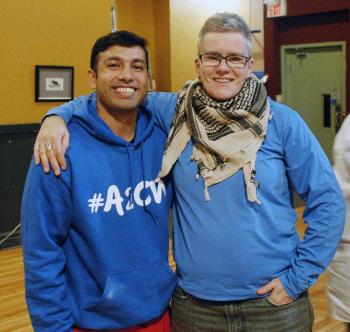Image Caption
Summary
By Brett Forester
Windspeaker.com Contributor
OTTAWA
A young man from Toronto arrived on Parliament Hill Nov. 9 to meet with federal government officials after completing an arduous 4,800 kilometre journey on foot from Vancouver to Ottawa.
Born in Pakistan, Hasan Syed grew up in Toronto and recently graduated from Lakehead University in Thunder Bay. He started the Access 2 Clean Water campaign on April 10 after learning that many First Nations in Canada do not have access to safe drinking water.
“Being an immigrant, you come to this land and you think everything is set up and everything is great, and that’s officially how it’s painted. I learned about this issue myself two years ago. I was very upset at myself for not knowing this the whole time and living in ignorance. When I found out, I was so infuriated that no one knows about this. It’s a topic that’s not discussed very widely. So I thought I’d go across and spread the message about this state of injustice.”
Syed said it took 193 days, not including rest days, to complete the 4,800 kilometre trek. He originally hoped to travel an ambitious 50 kilometres a day, but ended up completing on average between 24 and 30, running and, when necessary, walking.
He said raising awareness through running and walking was only the first step in the campaign. Access 2 Clean Water’s second step is currently in its pilot stage.
“The second phase is a user-friendly map of all the reserves that have boil water advisories. The government of Canada website is not very user-friendly. It’s going to give a physical representation of the nearest reserve that doesn’t have water.”
The government website in question says that in First Nations south of the 60th parallel there were 101 long-term and 43 short-term drinking water advisories as of September 30. Drinking water advisories include boil water, do not consume, and do not use advisories. They can be declared by chief and council or local government. The site says Canada hopes to end them all by 2021.
Syed said government was behind before it even started.
“It shouldn’t have happened to begin with. It’s past the deadline. It should have been done yesterday. I’m hoping they keep up with their deadline.”
Sharp Dopler heard about Syed from a friend and helped organize the event on Parliament Hill along with a reception afterwards. Dopler is an educator on Indigenous cultural competency and an active member of the Ottawa Indigenous community.
“It kind of blew my mind when I read his story about how he had this vision of Canada,” said Dopler. “And then when he found out it wasn’t what he thought it was, instead of saying ‘Oh that’s too bad,’ he actually did something about it.”
Dopler said Syed presents a fine example of how non-Indigenous individuals can constructively engage with issues affecting First Nations.
“People are often asking me what they can do to be allies. Well that’s what you can do to do be an ally. Just don’t sit there and talk about it. Take action.”
Hasan says he encourages all his supporters, viewers, and listeners to do three simple things.
“Go home and Google ‘First Nations water crisis in Canada.’ Just put those in. Even if they don’t have time to read the articles, just read the headlines. The least it’s going to do is educate you and give you an idea of what’s happening. Number two, I ask them to tell a friend or family member what they learned. Even a simple, blank statement. At least start a conversation. The least you could do is educate one person about the First Nations water crisis. Last, but not least, I ask them to question their MPs and ask them what they’re going to do. They need to be aware that their constituency is going to hold them accountable."
Access 2 Clean Water is on all major social media, and its website can be found here: https://www.a2cw.org/.

